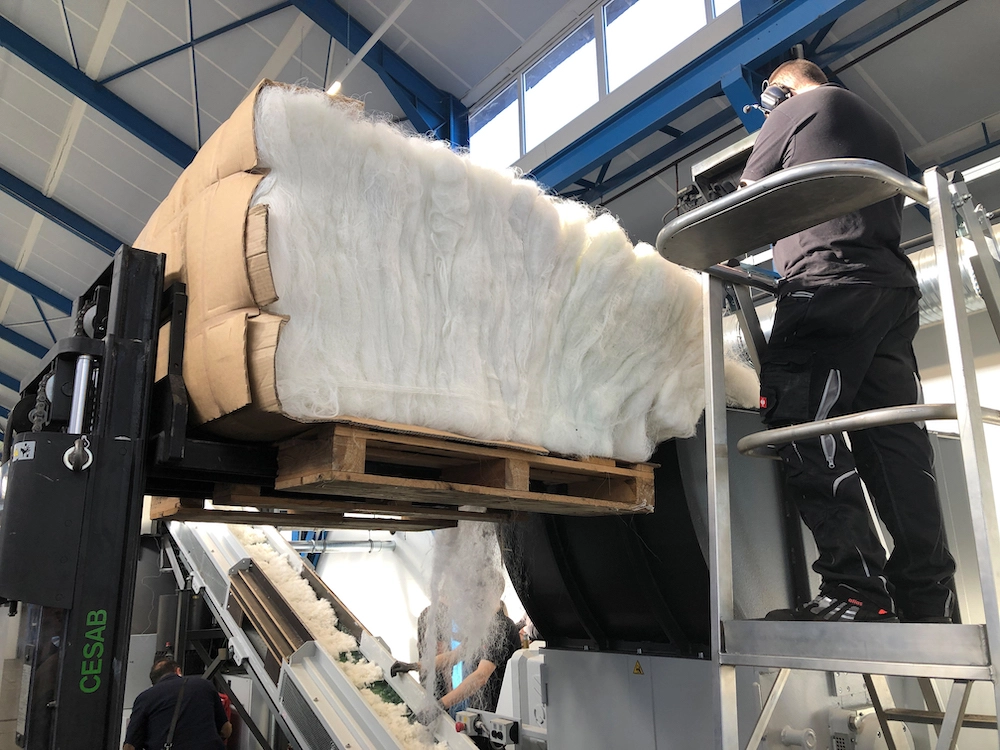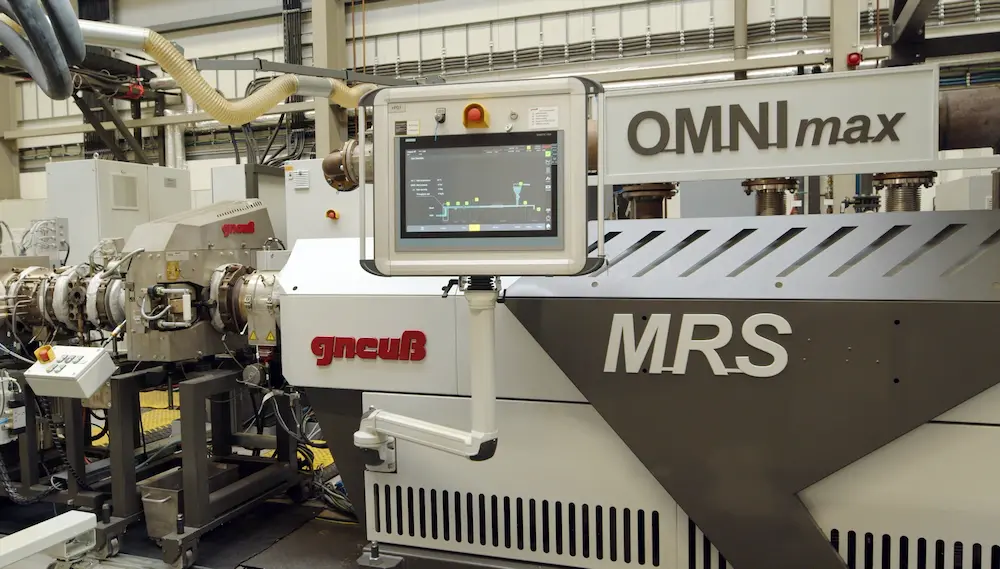The OMNImax technology revolutionises fibre recycling with an efficient, quick extrusion step
As sustainability becomes increasingly significant, fibre producers are turning more towards recycled materials. This includes transforming post-consumer PET bottle flakes into high-quality yarn and recycling PET fibre waste from manufacturing processes. However, the demand for PET bottle flakes is rising amongst bottle producers seeking to close their recycling loops, leading to a scarcity of affordable, high-quality flakes.
A major challenge with polyester is its propensity to absorb moisture, which can degrade the molecules during extrusion, weakening the polymer. The MRS multi-rotation extruder from Gneuss addresses this by removing moisture during the process, thus preserving the polymer’s properties.
Recycling PET fibres, particularly production waste, remains challenging due to its low “bulk density” (often under 100 g/l) and the presence of residual moisture and spin finish oils, complicating reintegration into extruders.
OMNImax Recycling System for Handling Industrial and Post-Consumer Fibre Waste
Gneuss presents at ITMA ASIA the OMNImax recycling systems, a robust, integrated solution for processing waste fibres efficiently. Each OMNImax system is an assembly of various Gneuss products and technologies tailored for specific recycling applications. It typically includes a 3C rotary feeder, an enhanced MRS extruder with an extended multi-screw section, a finely tuned vacuum system, an automated RSFgenius melt filtration system, and an online VIS viscometer.

The 3C rotary feeder processes low-density materials efficiently without requiring external processing. Material, such as shredded regrind, is delivered via a conveyor belt to a hopper, where a rapidly rotating disc equipped with knives cuts, compacts, and preconditions the material. This action not only cuts but also introduces energy, initiating the heating and degassing of the material before it automatically moves into the MRS extruder.
This MRS extruder offers a longer, modified version of the Multi Rotation Section, providing both longer material residence time and more surface exchange under vacuum. This enhanced Multi Rotation Section, combined with a powerful vacuum system operating at 1 mbar, enhances the viscosity of R-PET and maintains stability despite variations in the input material. This process removes the need for liquid phase polymerisation (LSP) or solid state polymerisation (SSP).
By stabilising or increasing the intrinsic viscosity during extrusion, the MRS becomes ideal for recycling applications like PET fibre regrind—where previously, direct recycling was not feasible due to low or inconsistent input viscosities. Utilising Gneuss Rotary Filtration Technology ensures high melt purity, and melt viscosity can be continuously monitored using an on-line VIS viscometer for quality assurance.
The OMNImax recycling line is notably compact, requiring minimal space and allowing for straightforward integration into existing production setups or direct adaptation to a fibre production line without the intermediary step of pelletising. This streamlined design also leads to significantly lower energy consumption, with the energy from the extrusion process being efficiently utilized in subsequent steps. This efficiency not only reduces electricity and gas usage but also substantially lowers the CO2 footprint of the recycling process.
The MRS extrusion process and Rotary Filtration Systems are globally recognized for their cleaning efficiency. In a single, streamlined extrusion step, they can remove harmful contaminants effectively, ensuring that the recycled materials are suitable for use in stringent applications. The brief residence time in the system prevents thermal damage, preserving the chemical properties of the recycled material to nearly match those of virgin material.
Back in 2011, Mogilev Khimvolokno in Belarus was a pioneer in using the MRS extruder to process agglomerated, wet, spin finish oil-treated PET post-industrial fibre waste. This application showcased the extruder’s capability to efficiently and reliably remove moisture and spin finish oils via vacuum in its multi-rotation degassing section, marking a significant success in fibre recycling.

Since that time, MRS technology has seen widespread and successful application in fibre recycling across the globe. The OMNImax system now offers a compact solution that recycles fibres directly and integrates seamlessly into existing fibre systems, significantly cutting down on labour and energy costs.
Gneuss Filtration Technology
Gneuss’ top model, the RSFgenius, operates with an integrated back-flushing system offering self-cleaning for very demanding applications and highest quality requirements. Screens can be automatically re-used up to 400 times and filtration finenesses below 10 microns/1200 mesh are available.
Retrofitting a fully-automatic RSFgenius to an existing extrusion line, whether in a pelletizing, or fibre application, permits the use of more contaminated (and often cheaper) material and/or the use of finer screens. Every retrofit is tailor-made and usually without the need to move any existing equipment.

























